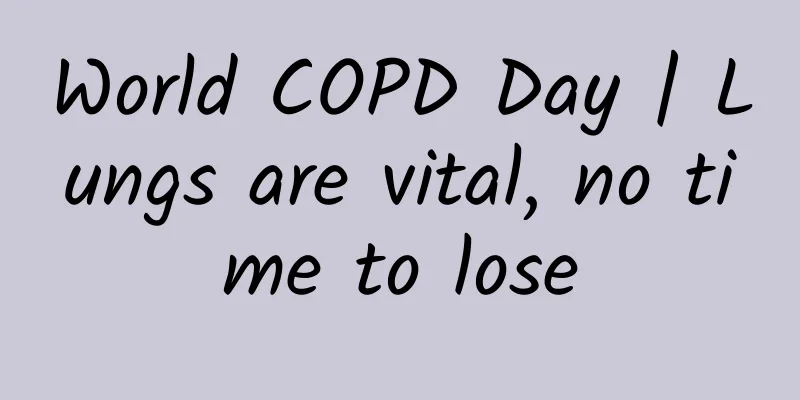World COPD Day | Lungs are vital, no time to lose

|
World COPD Day | "Lungs are life, no time to lose" Tongling Disease Control November 15, 2023 is the 22nd World COPD Day This year's theme is "Lungs are life, no time to lose" Aims to emphasize the importance of early lung health, early diagnosis and early intervention. Keeping your lungs healthy is an integral part of good health, and now more than ever it’s important to take action. 1. What is COPD? Chronic obstructive pulmonary disease (COPD) is a common, preventable and treatable disease characterized by persistent respiratory symptoms and airflow limitation, usually due to airway and/or alveolar abnormalities caused by significant exposure to noxious particles or gases. 2. Common symptoms of COPD The main symptoms of COPD are difficulty breathing, coughing and/or sputum production. It is also known as chronic bronchitis or emphysema in daily life. Chronic bronchitis refers to a chronic cough that produces sputum due to inflammation of the airways. Emphysema generally refers to the destruction of the tiny air sacs at the end of the airways in the lungs. COPD and asthma share common symptoms (coughing, wheezing and difficulty breathing), and people may suffer from both diseases at the same time. Severe patients often experience fatigue, weight loss and loss of appetite. 3. The harm of COPD As the disease progresses, COPD fails to heal, seriously threatening the patient's life and quality of life. 1. The patient's quality of life is getting worse; 2. Increased risk of acute exacerbation of COPD, hospitalization, and death; 3. Lead to pulmonary heart disease and even sudden death; 4. COPD patients often suffer from other chronic diseases, which increases the disability and mortality rates of COPD; 5. Increased economic burden, etc. 4. Who is prone to COPD? 1. Tobacco exposure: long-term smokers and second-hand smoke exposure; 2. Occupational exposure - those who are exposed to dust and harmful gases; 3. Indoor air pollution - long-term exposure to biomass fuels (wood, animal feces, crop residues) or coal, kitchen fumes, etc. 4. Congenital pulmonary hypoplasia - such as intrauterine dysplasia and premature birth; 5. Childhood infections and asthma - frequent or severe respiratory infections in childhood, childhood asthma; 6. Family history of COPD - alpha-1 antitrypsin deficiency can cause COPD at a young age. 5. Diagnosis of COPD COPD can be diagnosed based on the patient's symptoms, risk factors, pulmonary function tests, imaging tests, etc. Among them, pulmonary function tests are currently recognized as an objective indicator for detecting airflow limitation and are the "gold standard" for diagnosing COPD. 6. Prevention of COPD Six magic weapons for lung health↓ 1. Quit smoking Quitting smoking is the best way to improve lung health and overall health. Quitting smoking has the potential to reverse some of the damage done to the lungs by tobacco smoke, significantly reducing the incidence of COPD and slowing the progression of the disease. The sooner you quit smoking, the better. It is never too late to quit. 2. Vaccines Getting influenza vaccine and/or pneumonia vaccine can reduce the incidence of lower respiratory tract infections. For patients with COPD, it is recommended to get such vaccines under the guidance of a doctor. 3. Oxygen therapy Continuous low-flow, low-concentration (1-2 liters per minute, >15 hours per day) oxygen inhalation can improve symptoms of dyspnea and alleviate the situation of insufficient oxygen supply. 4. Lung function exercise Improve lung function by exercising your respiratory muscles through whole-body breathing exercises, pursed lip breathing, abdominal breathing, singing, whistling, blowing balloons, etc. 5. Follow the doctor's advice for treatment Actively cooperate with doctors in treatment and take medication regularly during the stable period to reduce COPD symptoms and reduce the frequency and severity of acute exacerbations of COPD. Follow the doctor's advice and maintain a civilized, healthy, green and environmentally friendly lifestyle. 6. Health management Exercise moderately every day, such as walking or riding a bicycle, to enhance your immunity. Eat a balanced diet and avoid high-calorie, high-salt, high-fat foods. Change cooking methods such as burning wood or coal to avoid inhaling or being exposed to particulate pollutants, nitrogen dioxide, etc. |
>>: World COPD Day | Breathe freely without any obstruction
Recommend
What to do if your vagina is dry during sex
Sex is an indispensable thing in our daily life. ...
Female genital hair removal methods
With the rapid development of life nowadays, many...
What to do if you have vaginal pain?
Compared with women, men pay less attention to pe...
Why do women have heavy beards?
Generally speaking, only men grow beards because ...
What foods should not be eaten when having pelvic effusion?
For women, gynecological diseases do not only exi...
Do new energy vehicles emit radiation? What are the standards for new energy vehicles?
The structure of pure electric vehicles is very s...
What medicine should I take less during my period?
After girls grow from small to large, they will e...
What should I do if a woman has sex with me?
The female vagina is a humid environment with a h...
Are breast cysts serious?
In fact, everyone is familiar with cysts. Cysts c...
Can you get pregnant after cesarean section for half a year?
Caesarean section is a method of delivery chosen ...
What to do if your face peels after pregnancy
A woman’s pregnancy is a big event for the whole ...
Reasons for delayed menstruation and brown vaginal discharge
Some women's menstruation does not come on ti...
Excessive leucorrhea, back pain and lower abdominal distension
The occurrence of excessive leucorrhea, lower bac...
What are the harms of barbecue? What can be barbecued?
During the Northern and Southern Dynasties, the t...
Causes of right-sided migraine in women
When a person's head hurts, he or she will be...









